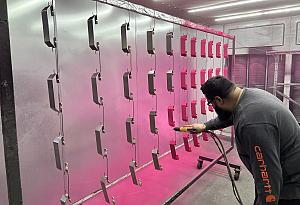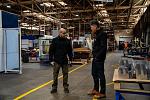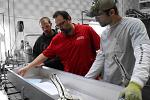Senior Editor
- FMA
- The Fabricator
- FABTECH
- Canadian Metalworking
Categories
- Additive Manufacturing
- Aluminum Welding
- Arc Welding
- Assembly and Joining
- Automation and Robotics
- Bending and Forming
- Consumables
- Cutting and Weld Prep
- Electric Vehicles
- En Español
- Finishing
- Hydroforming
- Laser Cutting
- Laser Welding
- Machining
- Manufacturing Software
- Materials Handling
- Metals/Materials
- Oxyfuel Cutting
- Plasma Cutting
- Power Tools
- Punching and Other Holemaking
- Roll Forming
- Safety
- Sawing
- Shearing
- Shop Management
- Testing and Measuring
- Tube and Pipe Fabrication
- Tube and Pipe Production
- Waterjet Cutting
Industry Directory
Webcasts
Podcasts
FAB 40
Advertise
Subscribe
Account Login
Search
The factory worker stigma
- By Tim Heston
- January 29, 2014
I wish President Obama knew more people like Steve Flesner. The vice president of business units at BEPeterson, a diversified heavy fabricator south of Boston, worked at a machine shop through high school, went to school for electrical engineering, and eventually landed a job at Nooter Corp. near St. Louis, where he moved away from electrical engineering and toward managing, selling, and growing the company’s significant pressure vessel business. In the 1990s he moved to Boston to be near family and landed a job at BEPeterson.
I’m betting that the most important part of his career—the experience that really defined how he would contribute to the economy—was on the shop floor, in the machine shop. In manufacturing, that hands-on expertise is truly treasured.
And the president said as much during last night’s State of the Union, expounding on education programs that meet the needs of a technically skilled work force. That’s great. But then he looked up at Mary Barra, the new CEO at General Motors, sitting in the balcony. She’s a GM lifer, and Obama used her life story to demonstrate economic mobility. Barra grew up working class, the daughter of a factory worker, and look at her now. Her story’s so positive, so American.
But wait—what’s wrong with being a factory worker?
At the 2011 FABTECH® show in Chicago, then Rep. Don Manzullo, R-Ill. (he was defeated in the 2012 election), spoke during his keynote address of manufacturing’s image challenge, which remains quite present in Congress. After all, many had parents who may have worked long hours in a factory to send their kids to college, so that they could have a better life.
Yes, they know that most factory workers today do not work in harsh conditions. Instead of breaking their backs, they run sophisticated machinery. But that classic, dark-and-dirty image of the early-20th Century factory worker remains burned in their psyche. True, you can still find welding-fume-filled fab shops having machinery without proper safeguarding. But these are gradually (some would argue too gradually) becoming the exception rather than the rule.
When it comes to manufacturing, our elected officials seem to give us conflicting messages. The United States needs people with the right skills. We need more research facilities, more engineering, and more manufacturing. But the country also needs everybody to go to college, even though some of the most sought-after skills on the factory floor do not require a four-year degree. Politicians want more factories, and they want more factory workers, but they also want to give people the opportunity to become more than a factory worker.
Too often, being the son or daughter of a factory worker accompanies some variation of a humble-beginnings, rags-to-riches tale. That implies that the factory worker is an unskilled laborer, with little education and even less opportunity, trapped in an unfulfilled life. These days you don’t find as many unskilled people on the factory floor. They’re not laborers. They’re operators and technicians. And over time they can earn enough to have a comfortable middle class life, just like people with four-year degrees, but without the debt.
Perhaps the stigma will fade within a generation or two. I hope it does. After all, the factory worker—that is, the skilled technician—makes the products others have researched and engineered, and you can’t have a domestic manufacturing industry without them.
subscribe now

The Fabricator is North America's leading magazine for the metal forming and fabricating industry. The magazine delivers the news, technical articles, and case histories that enable fabricators to do their jobs more efficiently. The Fabricator has served the industry since 1970.
start your free subscriptionAbout the Author

Tim Heston
2135 Point Blvd
Elgin, IL 60123
815-381-1314
Tim Heston, The Fabricator's senior editor, has covered the metal fabrication industry since 1998, starting his career at the American Welding Society's Welding Journal. Since then he has covered the full range of metal fabrication processes, from stamping, bending, and cutting to grinding and polishing. He joined The Fabricator's staff in October 2007.
Related Companies
- Stay connected from anywhere

Easily access valuable industry resources now with full access to the digital edition of The Fabricator.

Easily access valuable industry resources now with full access to the digital edition of The Welder.

Easily access valuable industry resources now with full access to the digital edition of The Tube and Pipe Journal.
- Podcasting
- Podcast:
- The Fabricator Podcast
- Published:
- 04/16/2024
- Running Time:
- 63:29
In this episode of The Fabricator Podcast, Caleb Chamberlain, co-founder and CEO of OSH Cut, discusses his company’s...
- Industry Events
16th Annual Safety Conference
- April 30 - May 1, 2024
- Elgin,
Pipe and Tube Conference
- May 21 - 22, 2024
- Omaha, NE
World-Class Roll Forming Workshop
- June 5 - 6, 2024
- Louisville, KY
Advanced Laser Application Workshop
- June 25 - 27, 2024
- Novi, MI































